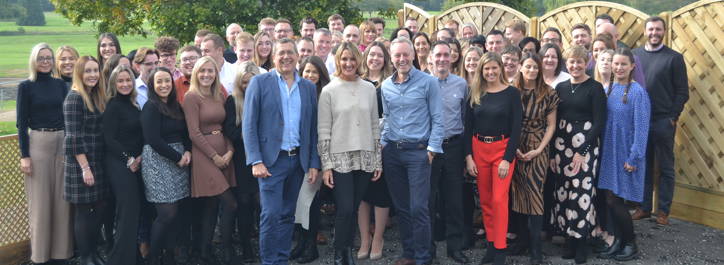Tales from the top – stories from our Finance Leadership Programme
In April 2024, we held our virtual Finance Leadership Programme, along with our partners Grant Thornton. During the session we heard from two senior finance professionals who, in a very frank and open Q&A session, told us how they’ve progressed in their careers, and gave us lots of advice and tips for aspiring CFOs. If you weren’t able to come along, don’t worry – here are all the details.
What’s the Finance Leadership Programme?
This unique programme helps finance professionals work on their personal and professional development, and boost their existing skills and knowledge. They also get the chance to network with colleagues from lots of different organisations and levels.

The speakers
Paul Haworth, Chief Financial Officer at GetBusy: Paul spent a decade with Deloitte advising listed and private technology and software clients, and leading transformational mergers and acquisitions engagements. After that he worked in senior corporate and commercial financial roles with listed international high-tech manufacturers, including Consort Medical, Dialight and LPA. He joined GetBusy, a productivity software specialist, immediately after the company offered its shares to the public in 2017. He now has responsibility for finance, operations, cybersecurity, legal and investor relations.
Matt Negus, Chief Financial Officer: Matt trained for his ACA qualification with Deloitte in Cambridge nearly 20 years ago. Since then, he’s worked for a range of companies in and around the city, including privately owned entrepreneurial groups and Japanese-owned subsidiaries. Most recently, Matt was Group CFO at a private equity-backed electronics manufacturing company with sites across the UK. Here he guided the owner through the sale process and then added a further three businesses to the Group – with his help their earnings grew five times in under four years. Matt particularly enjoys driving positive change in companies and seeing people develop.
The conversation
Why did you decide to take up accountancy as a career?
Matt: I was tricked into it! Not really, of course. I got into accountancy with Deloitte nearly 20 years ago, and my career progressed from there into a range of companies in the city. But I particularly enjoyed working for privately owned entrepreneurial groups – and I learnt a lot in this time.
Paul: I spent 10 years with one of the big four professional service firms. I enjoyed it but I began to find myself feeling envious of clients, who seemed to be having a lot more fun. And that was what made me move into the industry and ultimately end up where I am now.
My role at GetBusy is definitely my favourite so far. A lot of that’s down to the people I get to work with every day – interacting with their different mindsets and values through all the highs and the lows.
What do you enjoy most about working in accountancy?
Matt: People are everything, as is being in a team that’s doing something exciting. I love working on transformation projects where everyone’s gunning for the same goals. I enjoy change too – when there’s stuff to fix and you can see you’ve made a difference.
Paul: We’ve both done roles in oppressive and frustrating environments, as have a lot of people. What made you decide to persevere or move on?
Matt: Life’s way too short! I’ve hung on to jobs and stuck them out with the hope I can improve things. But sometimes you just have to admit that you’ve done everything you can and move on. It’s about deciding where to draw the line, and balance work with looking after yourself and your wellbeing. Although I wish I’d learned that 15 years ago!
Paul: Earlier in my career I definitely didn’t get the work-life balance right – but I felt it was worth it to get the experience. I don’t think you can do that forever though. It’s a marathon not a sprint.
It helps to have a family who understand what you’re trying to do and why, and that sometimes things happen at work that you simply have to deal with. The danger comes if your job title or role becomes your whole identity, and your priority – that almost always leads to burn-out or disappointment.
I still battle with the whole work-life balance thing. I’m self-motivated but I want to enjoy things while also still achieving. There has to be a balance.
When you started to look at Finance Director roles, what did you think these would involve? And how have these been different to what you thought?
Matt: The skills I learned when I was more junior have turned out to be important – like how to influence people. It’s about bringing insight and showing a business the numbers. If there’s a problem, the numbers always speak louder.
As a Chief Financial Officer/Finance Director, I work harder now to influence people. So much of leadership is taking people with you. By far the best progress is when you bring a team with you – having a strong team is key to going forward. People still don’t like change, and inertia remains strong.
Also, I did think the job would be easier than it turned out to be though!
Paul: Storytelling becomes much more important as you progress. It’s all about creating a vision and articulating a journey to all sorts of people - staff, investors, banks, customers, suppliers – and then explaining what that means for them. You also have to join the data to your story as much as possible. Nothing, especially not accountancy exams, prepares you to be good at that. And it’s really important.
Matt: You need to try stuff and give it a go – most people will be happy for you to take things on. It’s about working with them, and being happy to have a go and learn new things.
Paul: Get involved in whatever you can to add that breadth to your role and experience the business from different angles.
What have been the significant milestones on your journeys?
Matt: I’ve learned that hindsight isn’t your friend. You have to weigh up your personal opportunities.
I was very lucky that my first Finance Director job came up without me even looking for it. In fact, most of my decisions have been about where the company is at and where it’s going – I ask myself, have you done everything you can to help the company progress?
What have you learnt from those milestones?
Paul: In 2023, Silicon Valley Bank went bust, while holding a not insignificant proportion of our company’s money. Following nearly 15 years of global financial stability, no one was prepared for that. It seemed like the whole finance profession was working over the weekend to figure out what to do. That reinforced a key lesson for me - never, ever, take your eyes off the balance sheet or cash flow forecast. That might seem basic (and possibly quite boring!), but it’s THE thing you have to get right. It’s what gives you permission to do everything else.
CFOs are often made on their profit and loss, but destroyed on their balance sheets. Those basic skills you learn form the bedrock of your entire career and credibility.
So why would someone want to be a CFO?
Matt: It gives you a unique insight into business. I feel like the UK isn't particularly financially literate, and it’s really nice to influence and create an environment that you want to be in.
You also get to work in lots of different areas. Unless the numbers are good, and you and people understand them, the business is never going to be where it needs to be, for example, it’s amazing the effect you can have on margins simply by revealing where they're currently at. I really enjoy bringing insights, and watching a business grow and thrive.
Can you give us one top tip for being successful in this crazy world of finance?
Paul: Remember that it’s a marathon, not a sprint. Enjoy it. You’ve got to do things with a smile on your face. If you’re not enjoying the environment you’re in, get out of it or be really clear with yourself about why it’s worth it for a time – what are you learning? Keep a personal perspective on what you want to get out of life.
Would you like to be part of the next Finance Leadership Programme?
If you’re now feeling inspired, head to the website to find out more and sign up for updates. And if you’re interested in a new finance position, see what we have available.



